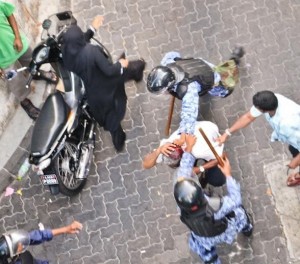Harbour construction is on-going in 48 islands while work is expected to begin in a further 10 islands during the year, Minister of Housing and Infrastructure Dr Mohamed Muiz informed parliament yesterday.
Appearing for minister’s question time, Muiz said projects for six islands have been sent to the tender board last week.
“Our hope is to solve the problem in the next year or so for all islands facing embarking and disembarking difficulties. God willing, we will achieve this,” he said.
Opposition Maldivian Democratic Party (MDP) MP Mariya Ahmed Didi had asked Muiz how many harbours have been constructed since the current administration took office in November.
The former MDP chairperson said 58 harbours were constructed during the three years of former President Mohamed Nasheed’s administration.
Kuribee and Nellaidhoo harbours
Muiz was summoned to respond to a question tabled by MDP MP for Vaikaradhoo, Mohamed Nazim, concerning harbour construction on two islands in his constituency.
Nazim noted that President Abdulla Yameen had pledged to expand the Kuribee harbour and that work had stalled on the Nellaidhoo harbour.
Muiz explained that construction began in Kuribee in 2011 for a 300-feet long and 150-feet wide harbour while the harbour in Nellaidhoo was to be 400-feet long and 150-feet wide.
Both projects were awarded to the Works Corporation Ltd (WCL) under contractor finance rules with the government-owned corporation providing equipment and material, he said, which then subcontracted Heavy Force Pvt Ltd for MVR21.5million (US$1.3 million).
However, construction stalled over difficulties faced by WCL in providing reinforcement boulders and the subcontractor stopped work on July 2012 after dredging and quay wall construction.
Of the 34 projects awarded to WCL in 2010 and 2011, an audit found that the government canceled 24 after the corporation failed to commence work. WCL had completed only one infrastructure project.
In late 2012, former President Dr Mohamed Waheed dissolved WCL and formed an office called public works under the Ministry of Housing and Infrastructure.
The public works division subcontracted Heavy Force to carry out the remaining work, Muiz continued, and agreed to provide equipment and material through the State Trading Organisation (STO).
“However, STO also faced difficulties providing reinforcement boulders and the work stalled for about 14 months with Heavy Force unable to continue,” he said.
Project changes
The present administration subsequently changed the project to a normal material and labour contract – “as is done in other islands” – and subcontracted Heavy Force for a cost of MVR36.3 million (US$2.3 million) in February this year, he revealed.
Muiz stressed that the decision was made based on the “counsel and advice” from elders and councillors from both islands.
As Kuribee islanders had requested widening the harbour to 200-feet and President Yameen had pledged to do so during a campaign trip, Muiz said the old quay wall had to be rebuilt with an additional 50-feet dug into the island.
Muiz said further “variations” would be undesirable as the project has been costly.
Public finance regulations stipulate a 10 percent limit for variations to projects, he explained, adding that the tender board only allowed exceptions on rare occasions.
On the stalled project in Nellaidhoo, Muiz said the both the contractor and supervising staff from the ministry had said that construction was proving difficult due to strong ocean currents.
The ministry and the contractor decided to build the outer seawall first, Muiz revealed, which is expected to begin in a month.
“Our target is to finish the harbours on both islands during this year,” he said.
In a follow-up question, however, MP Nazim said Kuribee islanders wanted the length of the harbour increased as well.
In response, Muiz said additional changes could be made in another phase after completing the project and “seeing how it is being used.”
Muiz also offered updates to a number of other MPs about harbour construction for islands in their constituencies. While harbour construction usually takes 12 months, he explained that delays were often caused by shortage of material.

